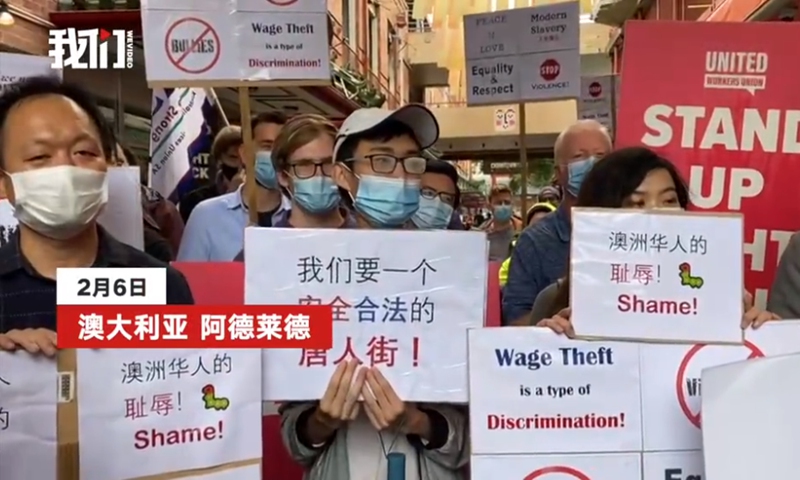IN-DEPTH / IN-DEPTH
Violent assault on employee amid claims of wage theft in Australia's Chinatown prompts protest against labor exploitation

Photo: Screenshot of The Beijing News video
Holding high placards with slogans including "wage theft is a type of discrimination" and "modern slavery," dozens of protesters crowded outside a Chinese-owned milk tea shop in local Chinatown of South Australia's Adelaide on Saturday.
After a Chinese female worker was violently attacked when she was claiming her wages in Chinatown business Fun Tea last week, people in Adelaide gathered to protest against the businesses' exploitation of employees and called for the protection of legal rights of vulnerable labor force, especially international students, ethnic minorities, and migrants.
The video of the confrontation between the female employee and the shop owner's camp, which started with words and turned physical, has gone viral on the internet and aroused outrage among netizens.
In the video, the employee, who is also an international student, was seen arguing with her boss after her request for wages was refused. A man, said to be a friend of the boss, slapped her and kicks her several meters away.
ABC News reported that the assailant Gavin Guo, a 39-year-old naturalized Chinese, has been arrested and would appeared in court in May. After the incident, the Fun Tea posted a notice outside the store acknowledging "a complaint about the employee's pay or rates of pay," but said the wage dispute between the store and its staff was unrelated to the alleged assault.
However, the Women's Working Centre, which represents the victims, issued a statement that said that their client "entirely rejects any assertion that the assault was not in relation to a complaint about her pay."
Say Leng Kapsis, organizers of the rally, hoped that through this protest, the issue of labor exploitation in South Australia will be resolved at an early date.
Kapsis had assisted the beaten employee to give a statement at the police, and she noted the incident had caused much distress to students involved who are now afraid to go out to work. But they refused offers of financial help from local organizations and individuals.
As founder of Fair Go SA, a non-profit organization provides counsel to vulnerable workers, Kapsis said they had received countless reports from victims receiving less than the minimum wage.
According to domestic news site bjnews.com, one in five people working in Australia has experienced wage theft.
Especially Chinese overseas students, who are not very aware of the local law and whose mother language is not English, often do not know how to defend their rights in the event of non-payment of wages and working overtime, Kapsis said.
"Australian law strictly limits part-time work to 20 hours per week for international students, with a minimum legal pay of about AUD $ 20 ( US $15.3) per hour, and businesses are required to protect the rights of part-time workers like multiple pay on weekends and holidays, but such part-time jobs are simply in short supply," Carson Xu, postgraduate student at Bond University in Queensland told the Global Times on Sunday.
Xu noted that as one of the top overseas destinations for Chinese students, Australia has become a paradise for merchants recruiting illegal workers for many years.
Especially in Chinatowns, where many Chinese students serve as restaurant waiters and supermarket clerks, some employers pay as little as AUD $10 per hour but can recruit many temporary workers, Xu added.
Zhang Jingjing, an undergraduate at the University of Melbourne told the Global Times that she used to do "odd jobs" at a Chinese supermarket for three weeks, but quit because she found it too hard.
"You can even work all day and weekends if you want to, but you will face heavy work and some inexplicable cold shoulder from the locals who discriminate against the Chinese. But the store owner is not worried at all, because even if you leave, there are plenty of overseas students who want to make money to replace you," Zhang said.
Fortunately, at present, in addition to many organizations like Fair Go SA campaigning for disadvantaged workers, a growing number of local Chinese have realized that labor exploitation is illegal and are beginning to strengthen their voices.
During the demonstration in Adelaide, many Chinese chanted demands such as "Unpaid wages are a disgrace to Chinese Australians" and "We want a safe and legal Chinatown."
"We expect a broader discussion and more regulators to step in to help everyone working in Australia get the rights and dignity they deserve," Xu said.
Global Times


